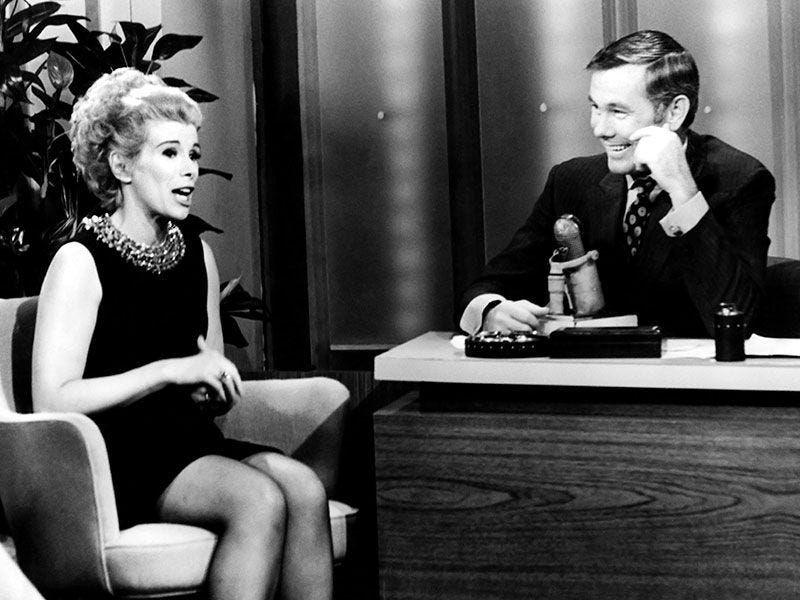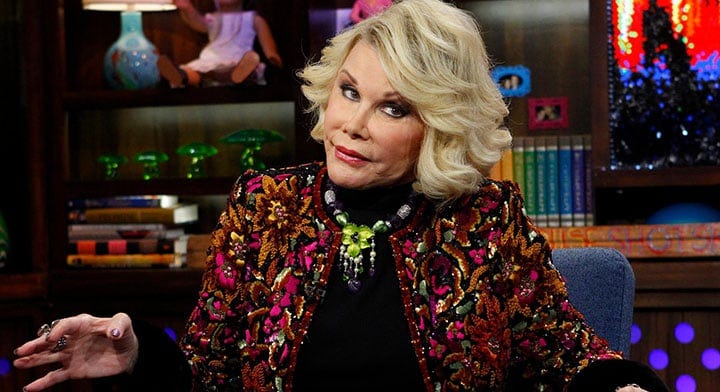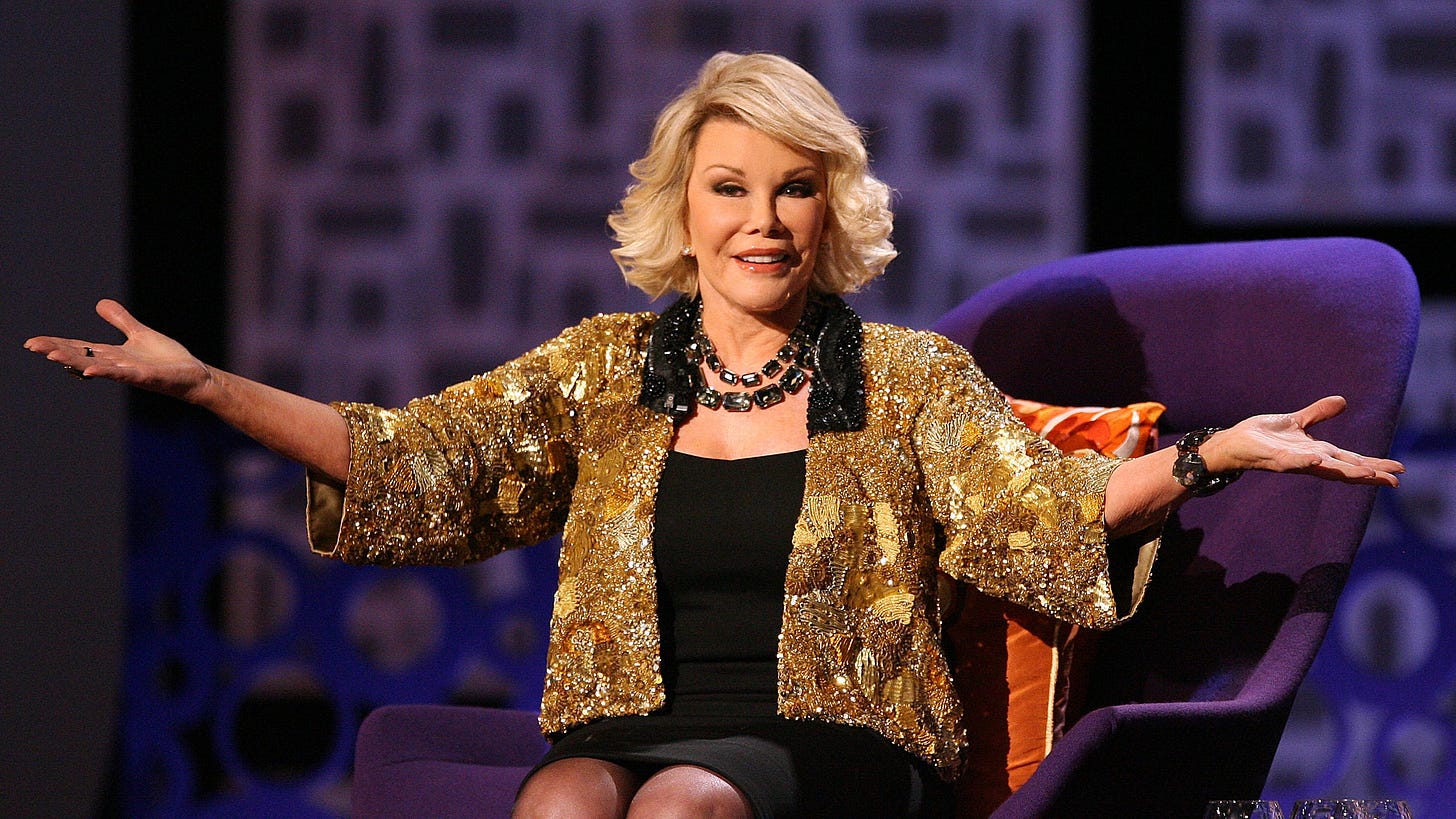In a world that supposedly cherishes authenticity, Joan Rivers was a singular force of absolute, unrelenting candour. Candour so potent, in fact, that it went beyond brutal honesty and barrelled straight into hostile artillery fire. Most people use humour as a way to ease tension; Joan, however, was a walking, talking shockwave. For her, comedy wasn’t just an art form; it was a full-on assault, with her never once missing the opportunity to throw a grenade. That she did it while dressed in sequins and feather boas—well, let’s call it camouflage for a comedic guerrilla.
It’s safe to say Joan Rivers wasn’t for the faint of heart. She was the queen of insult comedy, reigning supreme not just by sparing no one, but by taking savage delight in sparing no one. Joan treated every subject—whether a public figure, a cultural phenomenon, or even her own family members—as fair game. A sacred cow? She’d roast it well-done, wrap it in foil, and deliver it to the audience personally. The depths of her irreverence seemed fathomless. If anything was safe from Joan Rivers’ crosshairs, it was only because she hadn’t gotten around to it yet.
Joan Rivers wasn’t born a comedy icon; she clawed her way into the spotlight with wit as her weapon. Born Joan Alexandra Molinsky in 1933 in Brooklyn, New York, she grew up in a strict, middle-class Jewish household. Her parents, immigrants from Eastern Europe, had far more conventional aspirations for their daughter than stand-up comedy. Joan herself initially pursued the academic route, earning a degree in English literature from Barnard College. But academia couldn’t contain her ambition, and by the late 1950s, she was testing the waters of stand-up comedy in Greenwich Village’s smoky clubs.
Rivers' big break came when she appeared on The Tonight Show Starring Johnny Carson in 1965. Carson, impressed by her sharp and unapologetic humour, declared on-air, “You’re going to be a star.” It was the kind of endorsement comedians dreamed of, and Joan didn’t waste it. She became a regular guest on The Tonight Show, using the platform to cement her reputation as a quick-witted, fearless comic with a gift for skewering societal norms and taboos.
Rivers had a relentless work ethic matched only by her lack of restraint. She didn’t seem to understand that, typically, when someone asks you to tell them what you really think, they don’t actually mean it. To Joan, they meant exactly that, and she responded by letting loose an unfiltered monologue that left no survivors. Her attitude was that if a joke made someone uncomfortable, it was not her problem. She was both the ruthless critic and the performance artist, critiquing everything by setting fire to the sacred and dancing in the ashes—leaving no room for nuance, only scorch marks.
Joan was more than a comedian; she was a trailblazer in a field that barely acknowledged women as equals. In 1986, she became the first woman to host a late-night network talk show, The Late Show Starring Joan Rivers. While her tenure was short-lived, it was groundbreaking. Yet it also came with a heavy price: her decision to leave The Tonight Show for her own programme severed her relationship with Johnny Carson, who banned her from the show indefinitely. The fallout was brutal, but Rivers soldiered on, carving out her own space in a notoriously unforgiving industry.
And yet, for all her groundbreaking triumphs, Joan Rivers was never a neatly packaged feminist hero. She built a kingdom in stilettos, only to roast the handmaidens for their outfits. Her jokes about women were often brutal, even vicious—mocking bodies, plastic surgery, intelligence, sexuality. But perhaps that’s what made her so dangerous: she refused to carry the burden of being a symbol. Joan didn’t want to be your empowerment icon; she wanted your laugh. Feminist or antifeminist? She was both, and neither. She shattered glass ceilings, then mocked the women sweeping up the shards—and somewhere in that contradiction lived her defiant truth.
Of course, Joan was also fearless about personal jokes—ripping on herself with the same fervour that she tore into everyone else. Most comedians are either too fragile to go there or too calculated to risk exposing themselves, but Joan revelled in it. Plastic surgery jokes? She practically owned the genre. If her face moved less than a marble bust, well, she was the first to tell you. She joked about it so often that it ceased being self-deprecating and became something far stranger: a sort of public service announcement on the perils of vanity, delivered by someone who had no intention of changing course.
Joan Rivers didn’t simply walk the line between comedy and cruelty; she bulldozed over it, reverse-parked, and set up a lemonade stand. She was, for better or worse, as unyielding as her comedy. And while her jokes often hit their mark with surgical precision, they came with no apologies. Joan understood that comedy is, by nature, uncomfortable and that someone must always be sacrificed for the sake of a good laugh. And if that sacrifice happened to be her public image, then so be it. After all, Joan never cared for looking good; she was far too busy telling everyone else why they didn’t.
In her later years, Rivers found new life in television with Fashion Police, where she eviscerated celebrity fashion choices with the same sharpness she brought to her comedy. She embraced a multigenerational audience by appearing in reality TV (Joan & Melissa: Joan Knows Best?) and starring in the acclaimed documentary Joan Rivers: A Piece of Work. The film offered an unvarnished look at her life, revealing her insecurities, vulnerabilities, and the relentless drive that kept her going well into her 80s.
But behind the lacquered punchlines and surgical skin was a woman intimately acquainted with pain. Joan’s life was a battlefield strewn with losses—the suicide of her husband Edgar Rosenberg, professional betrayals, career exiles, and an industry that never forgave a woman for ageing or speaking too loudly. Comedy wasn’t just her craft; it was her clawing survival. The stage became both her sanctuary and her sparring ring, a place where control was hers, and pain could be sliced, repackaged, and thrown back at the audience as a joke. Every laugh she earned was a small resurrection. She didn’t just joke to cope—she joked to conquer.
One of the few constants in her tumultuous career was her daughter, Melissa. Their relationship—equal parts love, loyalty, and showbiz pragmatism—was both deeply human and unapologetically performative. Together, they built an empire out of resilience. Joan wasn’t a warm maternal figure by any stretch, but she was fiercely protective, and she carved out space for Melissa not just as family, but as a partner in comedic crime. Their reality show was a raw, absurd, and oddly tender glimpse into the transactional intimacy of a mother-daughter duo navigating fame, grief, and Botox.
Even as the entertainment industry evolved, Joan remained relevant, refusing to tone down her comedy for a more politically correct age. To her, comedy was a weapon against the absurdities of life, and she wielded it until the very end.
On September 4, 2014, Joan Rivers died at the age of 81, following complications from a routine throat procedure. Her sudden death shocked the public—not just because she had seemed indestructible, but because, in many ways, she had been. Joan was a woman who had endured public humiliation, industry exile, and personal tragedy, only to rise each time with sharper jokes and newer sequins. That she would go out not in a blaze of scandal or a final outrageous performance, but quietly in a hospital room, felt almost off-brand. But of course, even her death came with drama: lawsuits were filed, headlines swirled, and tributes poured in from admirers who had once feared or loathed her. In true Joan fashion, she didn’t just leave the stage—she made sure the spotlight stayed on.
And in case anyone thought death might soften her edge, Joan left us with one last scorcher. At NBC’s Joan Rivers: A Dead Funny All-Star Tribute, her daughter Melissa read aloud a letter Joan had written in anticipation of her own funeral. “Dear Melissa, if you are reading this, I am dead. And given that I am dead, I assume someone will finally decide to honor me. Well, it's about f---ing time.” She went on to leave scathing instructions for the production—no candid photos without full makeup, generous backlighting for the “aesthetically challenged,” and strict avoidance of anything resembling Mommy Dearest drama. Her parting shot? “Have Melissa close the show. She is much better at faking warmth, humility, and gratitude than I ever was.”
Even in death, Joan controlled the lighting, the camera angles, and the punchlines. She didn’t just write her own material; she wrote her own exit. It wasn’t a eulogy—it was a curtain call. One last laugh, scripted by the woman who never let the world define how, when, or why she’d speak.
In the age of cancel culture and carefully curated apologies, one wonders how Joan would have survived. The truth is—she wouldn’t have. She would have torched it. Joan didn't believe in moral consensus or community guidelines. She believed in consequences, yes, but not censorship. Her comedy was a test of your threshold, not your virtue. Would she have been cancelled? Probably weekly. Would she have apologised? Never. Joan believed the role of a comic was not to affirm your worldview but to deface it in public—and sign the graffiti.
Joan Rivers didn’t just tell jokes—she weaponised them. She turned honesty into artillery, fashion into satire, and pain into punchlines. She didn’t walk the tightrope between cruelty and comedy; she tore it down, built a runway, and strutted across it in rhinestones. She was a pioneer not because she made you feel good, but because she made you feel something—offended, amused, uncomfortable, awake. Joan never asked to be liked. She demanded to be heard.
She didn’t care about being kind; she was too busy being unforgettable.









